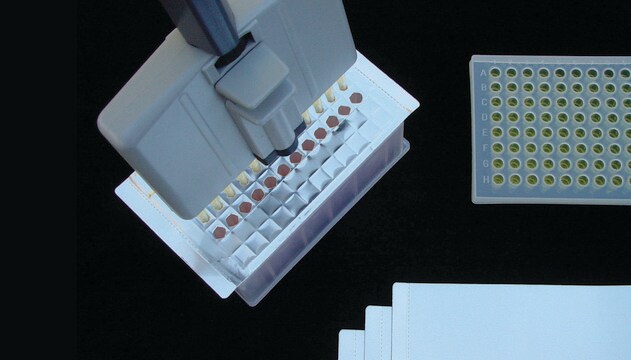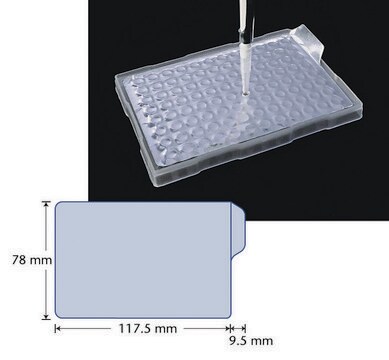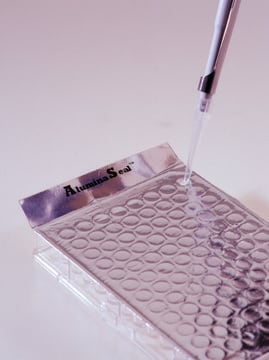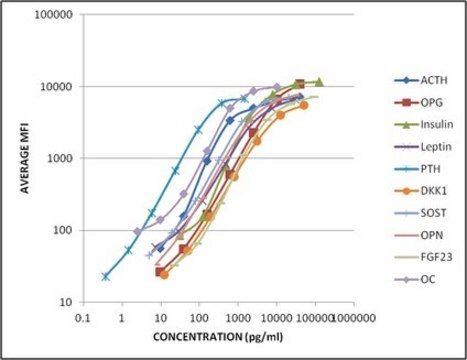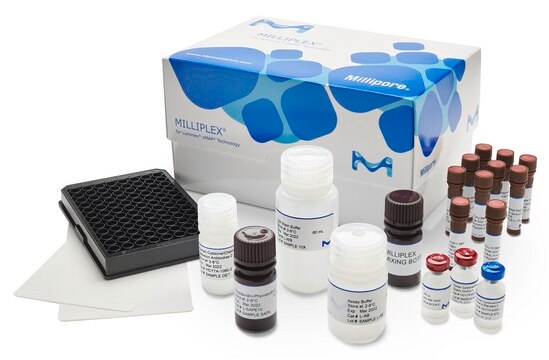HTS156RTA
Ready-to-Assay MC1 Melanocortin Receptor Frozen Cells
Anmeldenzur Ansicht organisationsspezifischer und vertraglich vereinbarter Preise
Alle Fotos(1)
About This Item
UNSPSC-Code:
41106514
eCl@ss:
32011203
NACRES:
NA.76
Empfohlene Produkte
Beschreibung
Cell line type: GPCR Cell Lines
GPCR Class A
protein target MC1
Qualitätsniveau
Methode(n)
cell based assay: suitable
Nachweisverfahren
fluorometric
Allgemeine Beschreibung
EMD Millipore′s Ready-to-Assay GPCR frozen cells are designed for simple, rapid calcium assays with no requirement for intensive cell culturing. EMD Millipore has optimized the freezing conditions to provide cells with high viability and functionality post-thaw. The user simply thaws the cells and resuspends them in media, dispenses cell suspension into assay plates and, following over night recovery, assays for calcium response.
The melanocortin-1 receptor (MC1) is a member of the G-protein-coupled receptor family of proteins that is responsible for regulating skin and hair color. The MC1 receptor is regulated by the physiological agonists alpha-melanocyte-stimulating hormone (α-MSH) and adrenocorticotropic hormone (ACTH), and antagonist agouti signaling protein (ASP) (Rouzud et al., 2005). In 1995 a landmark study demonstrated that over 80% of humans with red hair or fair skin have a dysfunctional variant of the MC1 gene (Valverde et al., 1995). MC1 is, therefore, a major determinant of sun sensitivity and genetic risk factor for melanoma and non-melanoma skin cancer. EMD Millipore′s cloned human MC1 receptor-expressing ChemiScreen cells were constructed by stable transfection of Chem-1 cells with the MC-1 receptor. These stability-tested cells are ready for cAMP accumulation assays for agonists, antagonists and modulators at the MC1 receptor.
The melanocortin-1 receptor (MC1) is a member of the G-protein-coupled receptor family of proteins that is responsible for regulating skin and hair color. The MC1 receptor is regulated by the physiological agonists alpha-melanocyte-stimulating hormone (α-MSH) and adrenocorticotropic hormone (ACTH), and antagonist agouti signaling protein (ASP) (Rouzud et al., 2005). In 1995 a landmark study demonstrated that over 80% of humans with red hair or fair skin have a dysfunctional variant of the MC1 gene (Valverde et al., 1995). MC1 is, therefore, a major determinant of sun sensitivity and genetic risk factor for melanoma and non-melanoma skin cancer. EMD Millipore′s cloned human MC1 receptor-expressing ChemiScreen cells were constructed by stable transfection of Chem-1 cells with the MC-1 receptor. These stability-tested cells are ready for cAMP accumulation assays for agonists, antagonists and modulators at the MC1 receptor.
Komponenten
Pack contains 2 vials of mycoplasma-free cells, 1 ml per vial. Fifty (50) mL of Media Component.
Haftungsausschluss
This product contains genetically modified organisms (GMO). Within the EU GMOs are regulated by Directives 2001/18/EC and 2009/41/EC of the European Parliament and of the Council and their national implementation in the member States respectively. This legislation obliges {HCompany} to request certain information about you and the establishment where the GMOs are being handled. Click here for Enduser Declaration (EUD) Form.Unless otherwise stated in our catalog or other company documentation accompanying the product(s), our products are intended for research use only and are not to be used for any other purpose, which includes but is not limited to, unauthorized commercial uses, in vitro diagnostic uses, ex vivo or in vivo therapeutic uses or any type of consumption or application to humans or animals.
Lagerklassenschlüssel
10 - Combustible liquids
WGK
WGK 1
Flammpunkt (°F)
Not applicable
Flammpunkt (°C)
Not applicable
Analysenzertifikate (COA)
Suchen Sie nach Analysenzertifikate (COA), indem Sie die Lot-/Chargennummer des Produkts eingeben. Lot- und Chargennummern sind auf dem Produktetikett hinter den Wörtern ‘Lot’ oder ‘Batch’ (Lot oder Charge) zu finden.
Besitzen Sie dieses Produkt bereits?
In der Dokumentenbibliothek finden Sie die Dokumentation zu den Produkten, die Sie kürzlich erworben haben.
Unser Team von Wissenschaftlern verfügt über Erfahrung in allen Forschungsbereichen einschließlich Life Science, Materialwissenschaften, chemischer Synthese, Chromatographie, Analytik und vielen mehr..
Setzen Sie sich mit dem technischen Dienst in Verbindung.